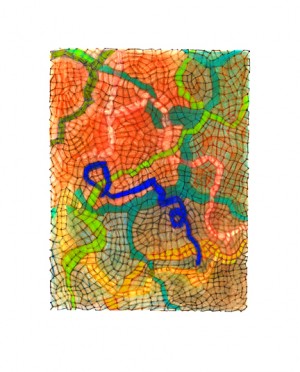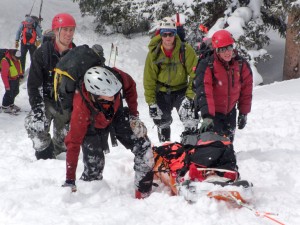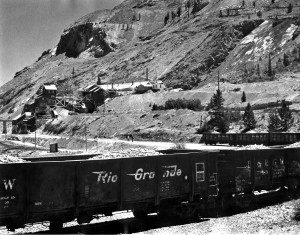by George Sibley
I continue to be thoroughly fascinated with the theory of plate tectonics, based as it is on what St. Paul (in an entirely different context) called “the evidence of things unseen.” Why are there volcanoes? Earthquakes? – both of which we have become reacquainted with in a big way recently. What unseen phenomenon of nature is this violence the evidence of? God’s displeasure was the old answer – still acceptable to many people, although that’s a pretty mean-spirited god to travel with.
Twentieth century earth scientists, beginning with German earth scientist Alfred Wegener in 1912, began to assemble a lot of seemingly disparate science – volcanoes, earthquakes, matching coastlines (South America and Africa) separated by oceans – into a theory even more fantastic than the idea of a loving god visiting earthquakes on his creation. The idea that the seemingly solid earth upon which we walk is made up of large plates of stone rising out of, and floating upon, an interior sea of molten rock. These big rock plates are pushed every which way from where the molten stuff wells up out of oceanic trenches. They collide with each other, grind against each other, ride up over each other, crack and buckle up, and where those things happen, earthquakes, volcanoes, beautiful mountains and horrific tragedies result. The evidence of things unseen.
But now I want to take a huge jump to an entirely different topic: the huge and often irrational upwelling of political, economic and cultural rage in America against – well, against a lot of things. And in most cases, a rage that seems both disproportionate to that against which it is vented, and as randomly misdirected as those natural phenomena we still call “acts of God.”
A local example. For the better part of a decade, Gunnison County has been under increasing pressure from the state to deal with an inadequate, unsafe, and often overcrowded jail. But twice – once under a Republican board of commissioners, more recently under a Democrat board of commissioners – the people of Gunnison County have voted down bond issues to finance a new jail. So the current crop of commissioners (all Democrats) figured out a way to finance a new jail without any new financing, thus getting the state off the county’s back without placing any additional burden on the taxpayers. One might think the commissioners would get a vote of thanks from the people for that.
But instead – a petition is being circulated to recall all three of them! For violating the state and national constitutions – exactly how has not been specified. Where does this come from? What is it “evidence” of?
Or go to the national level for even more dramatic examples. Why has the recent alleged “health care reform” generated such heat? As reforms go, the patch job that finally got passed was very modest. In fact, given the extent to which it was written and paid for by the so-called “health-care industries,” and has no “public option” to remind the private sector that something besides profitability should be kept in mind, I have a hard time thinking of it as reform at all. We are still at the mercy of corporate bottom lines.
Yet it has been portrayed publicly – in newspapers and magazines who ought to have known better – as some kind of vile cross between “socialism” and “fascism.” It has the very people who might find themselves a little better off than they were (at the expense of the federal budget) taking to the streets in what comes close to sounding like full revolt, opposing it, even though many of them cannot cite the specifics of it that bother them. Congressmen who voted for it – however lukewarmly – now have the cheerleader from Wasilla literally sighting them in her crosshairs (although she is of course not encouraging violence). Our own Congressman Salazar is in her sights. If he had been voting for a bill that nationalized health care, thus relegating to the graveyard of bad ideas the notion that stacking the deck to profit from human misery is an honorable occupation, then one could imagine cries of outrage from the industries directly affected. But this outrage from the very people most exploited by those industries? Huh?
This fall we Coloradans will again have to vote on Douglas Bruce’s endless manic push to phase out all government. We have militias organizing all over the place, belligerently armed, being diligently stirred toward mob behavior by demagogic “Limbecks” ranting on-air about how extreme our extremely mild-mannered and centrist president is – how they had “better start wearing a vest” (“Kelvar” understood) to protect themselves against “the enemy camp” in the White House.
So what I am wondering is this: is all this volcanic out-of-proportion rage just a lot of disparate and disconnected coincidence? Or is there some kind of “cultural tectonic” theory that we can apply to the situation? Something that does the cultural equivalent of tying all the volcanoes and earthquakes and tsunamis into a coherent tectonic explanation of that “evidence of things unseen”? What, in other words, is it that we aren’t talking about, but which is fueling the irrational rage?
Race is probably part of the answer on the national level, an unspoken source of fuel for “evidence” like the birth certificate flap and “Confederate Heritage Month,” but that doesn’t explain the health-reform craziness, “re-Brucing,” or our local recall petition.
“Class warfare” doesn’t seem to fit either – much of the more violent anger seems to be directed at anyone who wants more accountability from the wealth-and-power class that most blatantly exploits the angry.
And while a lot of the anger has been, and is still being directed at those who so blatantly exploited the housing boom and nearly collapsed the economy – if you really want to feel the hot waves of anger, just suggest raising taxes. Even raising them just on the economic sociopaths who have grown rich exploiting the rest of us. You won’t have time to even finish that sentence before the “Taxed Enough Already” (TEA)-partiers are on you. The tax cut for those of us in the lower percentiles that was part of the “health care reform” gets the president no points with the angry ones. Just the word “tax” vents the volcano and nothing more is heard.
So what’s a more comprehensive hypothesis about the cultural tectonics of disproportionate irrational rage? Try this, on the tectonic level. As a nation, as a people – probably as a civilization (Europe too) – we are in the throes of the “five stages to acceptance” of changes being forced by a hard truth. The Industrial Revolution is winding down and the American dream as we’ve known it is fading fast. Denial! Then anger (as the reality begins to leak in around the edges of our denial)! Then bargaining (well, if we just maybe change a little now, we won’t have to change a lot later). Then depression (life as we’ve known it is all over). And finally, acceptance (life does go on, even if it’s different).
An optimist might say – great! All this anger indicates that at least most of us are getting past the “denial” stage. That never-never land of clinging to the belief that the supply of easy cheap oil is infinite. That we are all too insignificant to change something so big as the global climate. That there will always be a technological fix to let us avoid having to make choices. That somehow five or six or ten billion people can eventually all live like Americans live today if we just – I dunno, wish on a star that might have another planet or two.
But a pessimist, or (as we pessimists like to see ourselves) a realist might point out that nation-states can get lost in their anger, which is always other-directed – it’s always somebody else’s fault, and if we just get rid of them. And, when people stuck in anger start reinforcing each other on that point. The German Nazi example comes to mind – and anyone who thinks Barack Obama is the one with “Nazi” tendencies just doesn’t see how history really repeats. (I worry more that he might become our von Hindenberg.)
No, to be at the “anger” stage of the change-acceptance process is no assurance of moving on to stage three. And stage three is no real bargain either. For those strong enough to look the possible bargains in the face, they all lead, like day leads to night, to stage four – depression. A lot of civilizations have just folded their tents and wandered off into their own self-made deserts at that stage. (The planet has usually breathed a sigh of relief.)
And that’s a cheery note on which to run out of space this month. Is it really worth the effort to try to figure out what unseen substratal forces are driving the surface “evidence of things unseen”? I don’t know. An understanding of plate tectonics doesn’t enable us to stop tectonic activity like volcanoes. But unlike the earth beneath our feet, we create our own societies, and a deeper knowledge of what is moving us as we do so might make them better, more humane societies. If that is what we actually want.
George Sibley was born in Western Pennsylvania, but was conceived in Colorado by Colorado natives, and thus considers himself to be a native Coloradan.


